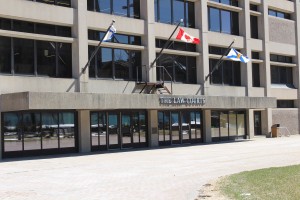
The Law Courts, Halifax, Nova Scotia
The Nova Scotia Court of Appeal ruled in favour of Trinity Western University today.I have drafted an Op-Ed piece and have submitted it to a newspaper for publication. If no paper will pick it up I will publish it here on my blog. In the meantime here are a few thoughts to ponder:
First, the Nova Scotia Court of Appeal ruled on what we call “administrative law” grounds. That is, it decided that the Nova Scotia Barristers Society did not have the jurisdiction to do what it claimed to do. In other words, its only jurisdiction is to act in the public interest in the practice of law. That means that it has a role in making sure that lawyers are equipped to do the work of a lawyer. It can make sure that a law graduate is from a school that has met all of the requirements in properly educating the law student. In this case the Federation of the Law Societies of Canada had determined that TWU was competent to carry out its teaching requirements. “The Society does not have a stand-alone authority over the public interest and the administration of justice.”
Second, the Society had taken it upon itself to determine whether TWU “unlawfully discriminates” under the Charter or the Nova Scotia Human Rights Act. However, the Court noted that TWU is a private university and is not subject to the Charter. In other words it has the benefit of being protected by the Charter but not the burden of the Charter. The Court also recognized the 2001 Supreme Court of Canada’s decision that the Charter does not apply to TWU as if it were a government agency. Further, the Court found that the Society had not “a supportive word” in Nova Scotia legislation that in anyway permitted the Society to “assert for itself an autonomous jurisdiction concurrent with that of a human rights board of inquiry.” Nor is there any legislative approval for it to be “a court of competent jurisdiction under the Charter with the authority to rule that someone’s conduct in British Columbia unlawfully violated the Charter.”
Given that TWU is not subject to the Charter and is exempt from the Human Rights legislation in BC it could not be found to “unlawfully” discriminate.
Third, the Society can only be concerned about the university to the extent it is in line with its responsibilities – the practice of law. By implication it has no business dealing with lawful religious practices of the university that is irrelevant to a graduate’s competence to practice law.
Fourth, the Society could not punish a TWU law graduate for the TWU admissions policy that it did not like. Here is how the Court put it: “Trinity Western’s law graduate is not Trinity Western’s alter ego.”

Observations:
I am very happy that TWU won this case. As I noted in an earlier post after the oral hearing I would have been surprised, given the struggle the Society had in presenting a convincing argument, that it had the authority to do what it claimed. From the get-go the Society has been off-side. With both Justice Jamie S. Campbell’s decision in the lower court and now the Court of Appeal decision that is the case. In my view, the Supreme Court of Canada will be hard pressed to go against its 2001 TWU decision in light of these two Nova Scotia decisions.
Unfortunately, the Court of Appeal did not address the religious freedom issues raised in the case. It would have been gratifying if the Court had agreed with Justice Campbell’s decision that TWU’s religious freedom was in fact infringed and that the proportionality test favoured TWU’s protection. However, a win is a win and this is a great day for religious freedom in Canada.
This entire case does raise some very important questions about political correctness in Canada. For example, how is it that a Christian university, which has done nothing wrong but kept faithful to its understanding of marriage since its inception, which does not violate the law in any way, could be so challenged by a barrage of legal cases in three provinces? How is that just? The law has been consistently on TWU’s side – save for the decisions out of the Ontario Courts – which we will have to wait to see how the Supreme Court of Canada deals with those. The Ontario decisions are problematic for religious freedom if they are left to stand.
Nevertheless, the amount of ridicule, the outright sophisticated arguments against TWU is unparalleled. It does not bode well for religious communities who are on the outside of secular norms. One would have thought that after the 2001 Supreme Court of Canada decision TWU would have been safe; but no it was not: one would have thought that after the Federation of the Law Societies of Canada decision TWU would have been safe; but no it was not. On and on it goes. Just when is enough enough?
Should TWU ultimately win at the Supreme Court of Canada in this case for its law school – will it be safe then? Perhaps if 20 years from now it wants to open a medical school will it have to again go through this same arduous process? Unfortunately, given its history, we would have to admit that it might. Why? Because its views on how one ought to live is no longer the norm in the opinion of Canadian elites?
It is time for this country to begin asking whether this treatment of religious communities is in keeping with our greater ideals. Is it the way of Canadian pluralism? Is it really allowing different groups to be all who they are as we live together on the same real estate?
No one is forced to attend TWU. No government money is propping up the school. This is a religious community doing what religious communities have done since about 600AD – run a university in keeping with their religious beliefs. Nothing that TWU has done is in anyway “unlawful” as the Nova Scotia Court of Appeal said – but still the struggle continues……
I posted a copy of the Nova Scotia Court of Appeal Decision here: https://www.academia.edu/27267678/NSCA_DECISION_NSBS_v_Trinity_Western.pdf


Thanks Barry I appreciate your blog and the insights you have provided.. God bless
Bullying, that’s what this is about. This is about three law societies and the lawyers who run them, to arrogantly mock, bully and abuse Christians for their beliefs and it’s got to stop! The legal battle unjustly waged against Trinity Western University is “political correctness” – which now equals “political craziness.” Barry, you wrote it well: “How is it that a Christian university, which has done nothing wrong but kept faithful to its understanding of marriage since its inception, (the Judeo-Christian worldview of traditional marriage between one man and one woman) which does not violate the law in any way, could be so challenged by a barrage of legal cases in three provinces? How is that just?” Well, to me, it is completely unjust, unfair and abusive. In one word: this is bullying. Who pays the horrendous legal costs to stop this harassment and abuse? Not to mention, the emotional anguish endured by innocent Christians in Canada, whose only goal is to try to do good for others? Thank you to the Nova Scotia Court of Appeal for their wise decision.
Good comments Barry. It is encouraging to see that some provincial Courts are still containing the impact of the moral crusaders in the legal profession. Is there any effort inside the legal profession to broaden its political philosophy and cut the PC hypersensitivity before more test cases show up? Should Osgoode Hall teach Politics 101 on multiculturalism, religious freedom and good manners?
If religious freedom is on the ropes, as you note, what should be done other than what organizations like CCCC are already doing? Is there a national Plan?